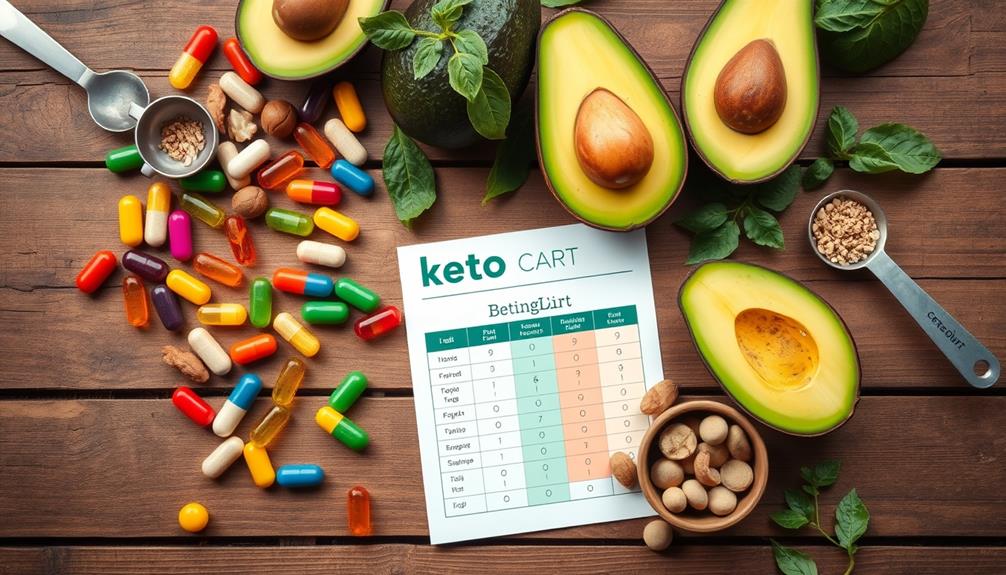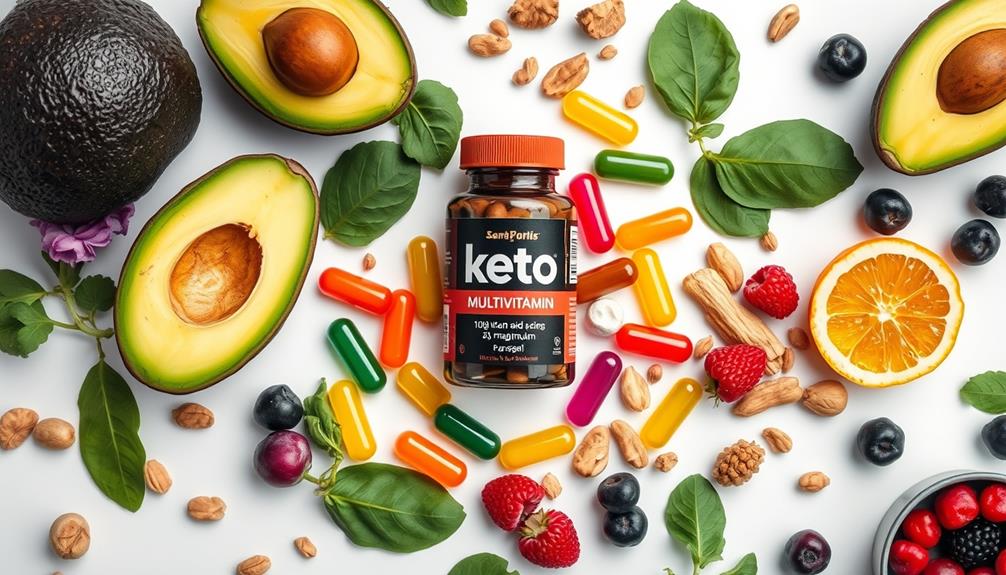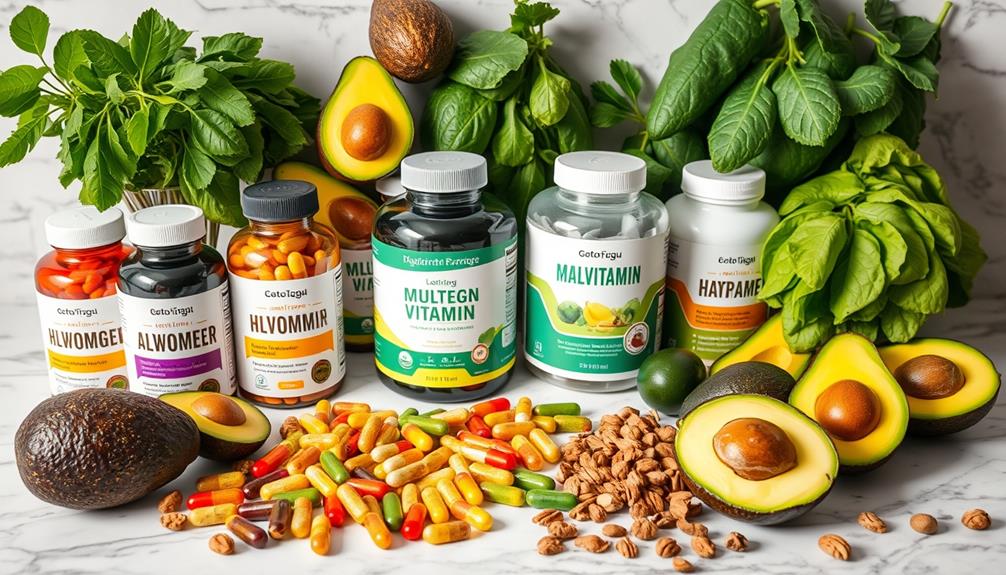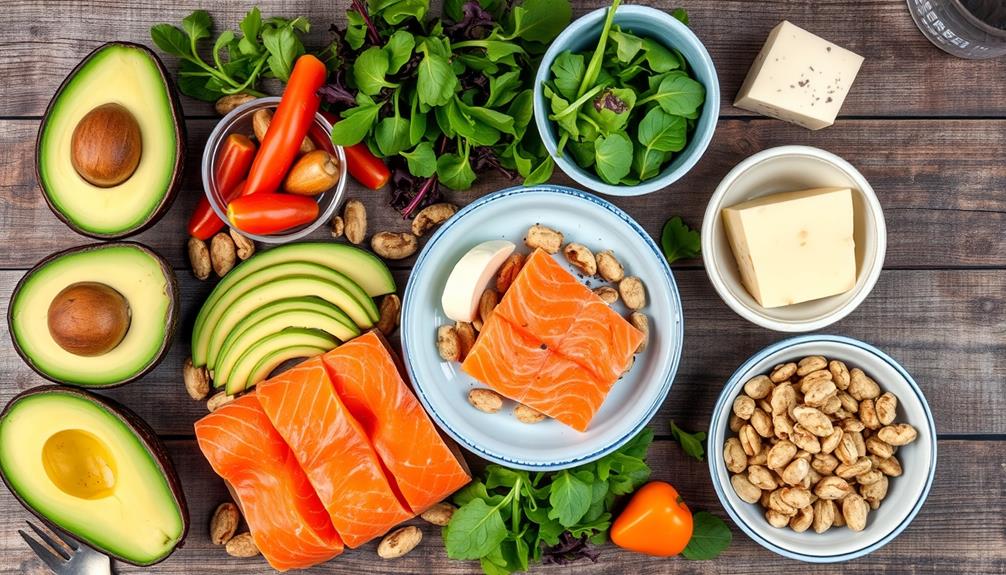When you're on a keto diet, choosing the right multivitamins can help fill nutrient gaps. Look for options rich in essential vitamins like A, D, and B-complex, plus important minerals like magnesium, calcium, and potassium. These nutrients support energy levels and overall wellness. Products like Keto Multi-Vit™ or Vitamin Bounty's Keto Multivitamin are popular choices, combining crucial components without added sugars. They also help combat "keto flu" symptoms. Don't forget to consult a healthcare professional for personalized advice. You'll discover valuable insights that can guide you on your keto journey and enhance your health.
Key Takeaways
- Look for multivitamins with essential vitamins like A, D, B-complex, and E to support overall health on a keto diet.
- Ensure multivitamins contain important minerals such as magnesium, calcium, and potassium to prevent deficiencies and support energy levels.
- Choose products that include electrolytes to help alleviate symptoms of "keto flu" and maintain hydration.
- Prioritize multivitamins with transparent ingredient lists, avoiding added sugars and fillers for better health benefits.
- Consider reputable brands like Keto Multi-Vit™ and Vitamin Bounty's Keto Multivitamin, which are formulated specifically for keto dietary needs.
Understanding Keto Supplements

When you're diving into the keto diet, understanding keto supplements is essential for optimizing your health. The keto diet typically restricts carbohydrate intake, which can lead to gaps in essential nutrients. That's where supplements come into play. By incorporating keto supplements, you can guarantee you're getting the vitamins and minerals that might be lacking in your daily meals.
Additionally, maintaining a balanced diet rich in fruits and vegetables can further complement your supplement regimen.
Common keto supplements include electrolytes, MCT oil, and various vitamins. These help prevent issues associated with nutrient deficiencies, like fatigue and headaches, often referred to as the "keto flu." A well-formulated keto supplement should have low carbohydrate content while providing a thorough blend of healthy fats and essential vitamins and minerals.
Before you start taking any keto supplements, it's smart to consult with a healthcare professional. They can help tailor a supplement regimen to your individual health needs and avoid potential side effects.
Ultimately, understanding these supplements is fundamental for maintaining balance, supporting your overall health, and making your shift into the keto lifestyle smoother. So, if you want to thrive on the keto diet, you need to take supplements that fill those nutritional gaps effectively.
Key Ingredients in Keto Multivitamins

When you're on a keto diet, it's vital to guarantee you're getting the right nutrients.
Key ingredients in keto multivitamins typically include essential vitamins, important minerals, and additional nutrients that support your health.
For instance, incorporating natural remedies can enhance your overall well-being during this low-carb journey.
Let's explore these components and how they can benefit your body during your low-carb journey.
Essential Vitamins Overview
Keto multivitamins typically contain a variety of essential vitamins and minerals that support your health while following a low-carb diet. These nutrients play a significant role in enhancing energy metabolism and ensuring you don't experience deficiencies.
For instance, incorporating essential oils like eucalyptus oil can aid in respiratory health, which is beneficial for maintaining overall wellness during dietary changes.
Here's a quick overview of key vitamins and their benefits:
- Vitamin A: Supports vision and immune function.
- Vitamin D: Essential for bone health and immune support.
- B-complex Vitamins: Significant for energy production and metabolism.
- Vitamin E: Acts as an antioxidant, protecting your cells.
In addition to these vitamins, minerals like magnesium, potassium, and calcium are important for overall wellness, especially since many high-carb sources of these nutrients are removed in keto.
These minerals not only help prevent deficiencies but also support muscle function and hydration.
Moreover, probiotics and digestive enzymes may be included to enhance nutrient absorption, which can be challenging on a low-carb diet.
With the right balance of vitamins and minerals, you can help maintain your energy levels and overall health while enjoying the benefits of a ketogenic lifestyle.
Key Mineral Components
Key minerals play an essential role in supporting your health on a ketogenic diet. Among these, magnesium is a key mineral you shouldn't overlook. It supports over 300 bodily functions, and since keto limits magnesium-rich foods like whole grains and legumes, supplementation can help prevent deficiencies.
Understanding common financial terms related to health investments can also enhance your approach to maintaining a healthy lifestyle.
Calcium is another essential mineral, important for muscle contraction and bone health. Adults need about 1,000mg daily, so you'll want to find keto-friendly sources such as sardines and leafy greens.
Potassium is significant for maintaining electrolyte balance and can help stave off symptoms of "keto flu." Aim for a daily intake of around 2,500-3,000mg, which you can get from avocados and spinach.
Lastly, zinc plays a noteworthy role in immune function and metabolism. With daily requirements of 11mg for men and 8mg for women, it can be challenging to meet these needs on a restrictive diet.
Incorporating these key minerals into your keto multivitamin guarantees you're covering your nutritional bases, supporting your overall health, and keeping your energy levels stable while enjoying the benefits of the ketogenic lifestyle.
Additional Nutrient Benefits
Understanding the significance of key minerals lays the groundwork for exploring the additional nutrient benefits found in keto multivitamins. These supplements are designed to support your ketogenic diet by addressing potential deficiencies and enhancing overall health.
For example, maintaining hydration levels is essential, especially when considering electrolytes like sodium, potassium, and calcium, which are important in reducing the symptoms of the "keto flu" and ensuring overall well-being hydration levels should be monitored during juice cleanses.
Here are some key ingredients that provide significant health benefits:
- Magnesium: Critical for over 300 bodily functions, it helps prevent deficiencies when your diet is restrictive.
- B-complex vitamins: These are fundamental for energy metabolism and can help tackle fatigue often experienced on a keto diet.
- Electrolytes: Sodium, potassium, and calcium are important in maintaining hydration and reducing the symptoms of the "keto flu."
- MCTs: Medium Chain Triglycerides offer a quick energy source, ensuring you stay energized throughout the day.
Incorporating additional vitamins like C, D, and E helps round out your nutritional intake, while antioxidants like green tea extract and spirulina bolster your health.
When you're on a ketogenic diet, these key ingredients in multivitamins provide necessary support, ensuring you get the most out of your supplements and maintain peak health.
Health Benefits of Multivitamins

Many people find that incorporating multivitamins into their routine can greatly enhance their health, especially when following a keto diet. The restrictions of this diet can lead to nutrient deficiencies, making it essential to supplement with a quality multivitamin. These supplements often include important nutrients like magnesium, calcium, and potassium, which support energy production, muscle contraction, and hydration.
By filling nutritional gaps, multivitamins can help improve your overall wellness and potentially prevent chronic conditions related to deficiencies, such as osteoporosis and anemia.
If you're experiencing symptoms of "keto flu," like fatigue and irritability, a multivitamin formulated for the keto diet can make a difference. These specially designed multivitamins may also contain MCTs and electrolytes, helping you maintain energy levels and electrolyte balance during ketosis.
Incorporating multivitamins into your daily routine not only addresses the unique needs of your body while on a keto diet but also promotes long-term health benefits.
Potential Side Effects of Supplements

When you start taking keto supplements, you might notice some gastrointestinal issues like bloating or diarrhea, especially if you're adjusting your dosage.
It's also important to keep an eye on electrolyte levels since imbalances can lead to serious health risks.
Overdoing vitamins and minerals can lead to toxicity, so it's vital to monitor your intake closely.
Common Gastrointestinal Issues
Experiencing gastrointestinal issues is a common challenge for those on a ketogenic diet, often exacerbated by the introduction of various supplements. You might encounter symptoms like constipation or diarrhea, primarily due to a lack of fiber from restricted food groups.
Additionally, as your body adjusts to ketosis, you may experience "keto flu," which can include nausea and stomach discomfort.
To help manage these issues, consider the following:
- Monitor your fiber intake to prevent constipation.
- Be cautious with high MCT supplements, which can cause bloating.
- Stay hydrated to counteract the effects of electrolyte imbalances.
- Consult a healthcare provider for tailored medical advice.
Individual tolerance to supplements varies greatly, so it's essential to pay attention to how your body reacts.
If you notice persistent gastrointestinal issues, don't hesitate to seek medical advice. This will guarantee you can enjoy the benefits of a ketogenic diet while minimizing any uncomfortable side effects.
Electrolyte Imbalance Risks
Electrolyte imbalances can pose significant risks for those following a ketogenic diet, especially as your carbohydrate intake drops. When you reduce carbs, insulin levels decrease, which affects how your body retains key electrolytes. Sodium, potassium, and magnesium are essential for various bodily functions, including nerve signaling and muscle contraction.
If your levels of these electrolytes drop, you might experience symptoms like fatigue, muscle cramps, irregular heartbeat, and dizziness.
To help mitigate the risk of electrolyte imbalances, many people turn to supplementation. While this can be beneficial, it's important to monitor your intake carefully. Over-supplementing can lead to conditions like hypernatremia (excess sodium) or hyperkalemia (excess potassium), both of which can be dangerous.
Regularly consulting with a healthcare professional can help you assess your electrolyte levels and adjust your supplementation accordingly. Maintaining a healthy balance during ketosis is critical to your overall well-being, so keep an eye on your body's signals and verify you're getting the right nutrients without going overboard.
Overdose of Vitamins
How aware are you of the potential dangers of vitamin overdose? When you're on a ketogenic diet, it's easy to think that more is better, especially with supplements. However, overdosing on vitamins can lead to toxicity, particularly with fat-soluble vitamins like A, D, E, and K, which accumulate in your body's tissues.
Here are some key points to bear in mind:
- Nausea and headaches can be early signs of overdose.
- Dizziness might indicate your body's struggling to handle excess vitamins.
- Organ damage or failure can occur, particularly with excessive A and D intake.
- Nerve damage may arise from high doses of vitamin B6, even though it's water-soluble.
The recommended dietary allowances (RDAs) exist to guide your intake and prevent deficiencies. If you rely heavily on supplements without monitoring your dietary sources, you could be at risk.
Always consult a healthcare provider before ramping up your vitamin intake. By being vigilant about potential overdose, you can better support your health while enjoying the benefits of a ketogenic diet.
Choosing the Right Keto Multivitamin

Selecting the right keto multivitamin can greatly impact your overall health while following a low-carb diet. You should prioritize a multivitamin that includes a thorough blend of essential vitamins and minerals, particularly magnesium, calcium, and potassium. These nutrients are often depleted when you cut carbs.
In addition, incorporating electrolytes into your multivitamin can help maintain hydration and stave off symptoms of the "keto flu," like fatigue and headaches.
Transparency in the ingredient list is vital. Make sure your chosen keto multivitamin is free from added sugars and high-carb fillers, which can derail your dietary goals.
Opt for products that use whole food sources or superfoods, as these may provide additional nutritional benefits and offer improved absorption compared to synthetic options.
Alternatives to Multivitamins

Exploring alternatives to multivitamins can enhance your nutrient intake while sticking to a keto diet. By focusing on whole foods, you can easily meet your body's needs for essential vitamins and minerals without relying on supplements.
Here are some great alternatives:
- Leafy greens: Packed with vitamins A, C, and K, they're a staple for any keto diet.
- High-fiber foods: Incorporate avocados, chia seeds, and flaxseeds to support digestive health and alleviate fiber deficiencies.
- Bone broth: This nutrient-dense option provides collagen and amino acids, which are fantastic for joint health and overall wellness.
- Superfoods: Adding spirulina and wheatgrass to your meals can boost your nutrient intake and offer antioxidants.
If you find it challenging to get enough fiber, consider using food-based fiber supplements like psyllium husk. These can help maintain gut health and guarantee regularity.
Recommended Multivitamin Products

If whole food alternatives aren't meeting your nutritional needs on a keto diet, consider incorporating high-quality multivitamins specifically formulated for this lifestyle. One excellent option is Keto Multi-Vit™, which provides 21 essential vitamins and minerals, enhanced with 42 fruits and vegetable blends. This product supports overall wellness while also including MCT oil, antioxidants, digestive enzymes, and probiotics to boost nutritional absorption and gut health.
Another top choice is Vitamin Bounty's Keto Multivitamin. It's packed with critical nutrients like magnesium and potassium, plus herbal extracts that help maintain energy levels and fight fatigue during your weight loss journey.
Both of these multivitamins recommend taking three tablets or capsules daily with meals to optimize absorption and effectively address nutrient deficiencies often faced on a ketogenic diet.
Customer feedback shows that these multivitamins can lead to improved hydration, reduced bloating, and overall wellness, making them a great addition to your keto routine.
Always consult with a registered dietitian to verify you're choosing the best multivitamins for your specific dietary needs and lifestyle.
Frequently Asked Questions
Should You Take a Multivitamin on Keto?
You should consider taking a multivitamin on keto, as it helps fill nutritional gaps from decreased fruit and vegetable intake. It can prevent deficiencies and support your overall health during the diet change.
What Vitamin Supplements Can You Take on Keto Diet?
On a keto journey, think of your body as a finely tuned machine. You can take magnesium, potassium, B-complex vitamins, omega-3s, vitamin D, and fiber supplements to keep everything running smoothly and feeling energized.
What Vitamins Am I Lacking on Keto?
On a keto diet, you might be lacking magnesium, calcium, iron, and B vitamins. Vitamin D levels may also drop due to limited sources and sunlight, so consider supplementing to meet your nutritional needs.
Is Centrum Good for Keto?
Centrum can be a good option for you on keto, but check for added sugars. It offers essential vitamins and minerals, helping to fill gaps in your nutrition, especially magnesium and calcium, which you might lack.
Conclusion
As you commence your keto journey, think of a vibrant garden—each multivitamin a seed nurturing your health. With the right blend of nutrients, you'll cultivate energy, support your body, and bloom into your best self. Remember, while supplements can be your allies, they're just part of the tapestry; whole foods play an essential role too. Choose wisely, listen to your body, and watch your wellness flourish, transforming your keto experience into a flourishing lifestyle.









